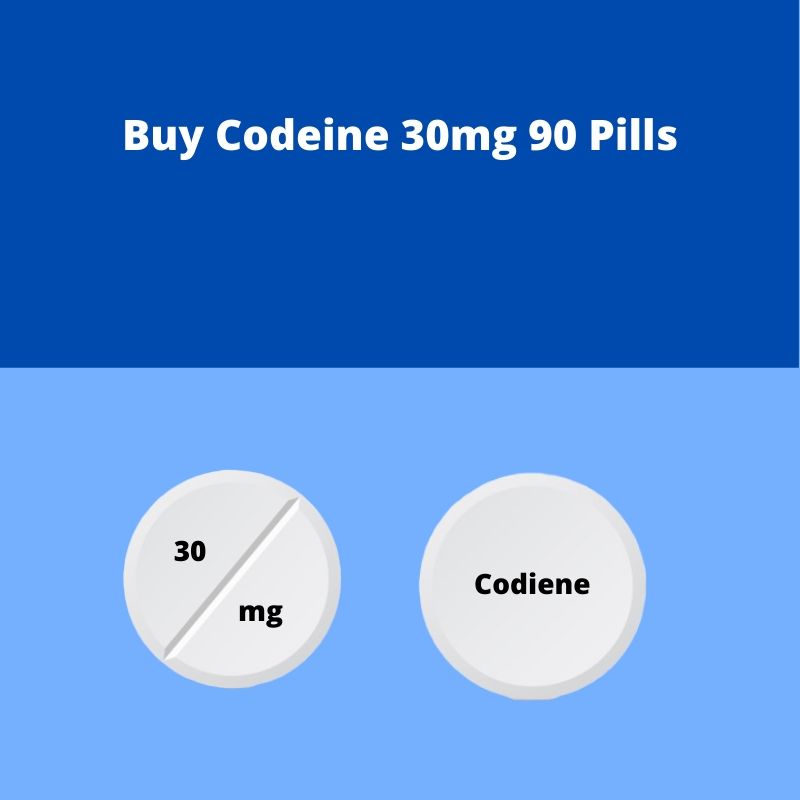| Active ingredient | Codeine Sulphate |
|---|---|
| Drug Class | Antitussives, narcotics, opioid analgesics |
| Kicks In | Within an hour |
| Treatment Period | Strictly decided by the doctor |
Codeine 30 mg
Codeine 30 mg is a prescription drug for pain. It is generally used to relieve mild to serve pain. It may be used in combination with other drugs or alone, as per the requirements. Codeine belongs to a class of drugs which are known as opioid analgesics. They help change your response to the pain. In some cases, codeine may also be used to treat cough.
How does Codeine 30 mg work?
Codeine 30 mg works by controlling brain’s response to pain. It stops the pain signals travelling from the nerves to the brain.
Recommended Dosage
Since the dosage depends on your medical condition, take the medication exactly as it is prescribed by your doctor. Although it is not recommended for a longer duration of time, your doctor may recommend long-acting opioid medications in case of ongoing pain. Use it exactly as it is prescribed. The maximum dose for 24 hours is not more than 360 mg.
Usage
The drug is usually administered orally. It can be taken with food or without it. Another way that this product is used is in its liquid form. In that case, the dosage should be carefully measured using a specialised measuring device. Do not take a higher dose of this drug, or use it for a prolonged period of time. This can cause negative effects. Usually, pain medicines work effectively if they are taken at the first sign of pain, rather than later when the pain has worsened.
What if I Overdose?
If symptoms such as passing out or trouble breathing occur, then give the patient naloxone if it is available, and then seek medical help. If the person is awake and has no symptoms, get immediate help. Symptoms of overdose include slow/shallow breathing, decreased heart rate, severe drowsiness, coma, etc.
What if I miss a dose?
If you are on a regular schedule, then in case of a missed dosage, take it as soon as you remember. However, if it’s almost time for your next dose then skip the missed dose. Do not double your dose to make up for the skipped dose.
What if I stop using Codeine 30 mg?
Abruptly discontinuing the medication can cause withdrawal symptoms. There are increased chances of withdrawal if the medication is used in higher doses or for a longer duration of time. In order to avoid these symptoms, your doctor may reduce your dose slowly. Withdrawal symptoms include
- Restlessness
- Changes in mood
- Watery eyes
- Runny nose
- Nausea
- Diarrhea
- Sweating
- Ache in muscles
In case of any withdrawal symptoms, inform your doctor at the earliest.
Side effects of Codeine 30 mg
Some commonly occurring side effects of codeine are:
- Drowsiness
- Dizziness
- Nausea
- Puking
- Lightheadedness
However, with regular, organised administration, these symptoms usually subside. In case of persistence, inform your doctor. It is also possible that the drug causes severe effects. These include:
- Sleep Apnea
- Shallow breathing
- Weak pulse
- Slow or fast heart rate,
- Unusual thoughts or behavior
- Confusion
- Extreme sadness or happiness
- Light-headedness
- Hallucinations
- Loss of coordination
- Loss of appetite
- Difficulty in urinating
In the case of the appearance of any of these symptoms, seek immediate medical assistance.
Before Using Codeine
Since codeine is an opioid drug, there is an increased chance of addiction. Chances are higher if you have a history of substance abuse. In order to avoid that, the prescription schedule as it is devised by your doctor should be strictly followed.
If codeine is taken for a long time then chances are that it may not work that well. Inform your doctor if the medication is not helping you any longer.
It’s important that you discuss with your doctor your medical history. Discuss your medical history especially if you have a history of brain disorders, breathing problems, gallbladder disease, kidney disease, liver disease, mental/mood disorders, personal or family history of substance abuse, obesity, stomach/intestinal problems, etc.
One of the side effects of the drug is dizziness and drowsiness. Alcohol or marijuana is worse. Do not drive or use heavy machinery, or do anything that requires you to pay attention. Avoid alcoholic beverages.
It has been recorded that for older adults codeine can cause confusion and over-sedation.
Like older adults, some children may also be more sensitive to very serious side effects of codeine, such as extreme sleepiness, confusion, etc.
It is recommended to not use this medication during pregnancy and breastfeeding. It is possible that it may harm the baby. During breastfeeding, it may pass onto the nursing infant and can cause difficulties. Discuss the risks and benefits with your doctor in detail.
Storage Instructions
Store at a cool, dry temperature, away from moisture. Do not store it in the bathroom.
Make sure that it is away from children’s or your pet’s reach.
Properly discard the product when it has expired or is no longer needed.
Frequently Asked Questions (FAQs)
What is Codeine 30 mg used for?
Codeine 30 mg is usually used to treat mild to moderately severe pain. However, they can also be used to treat flu and the common cold.
What is the usual dose of Codeine?
The usual dose of codeine is between 15 mg to 60 mg. This dosage can be repeated four times a day. In the case of adults, a dosage of 30mg tablets every four hours is accepted. The maximum dose for 24 hours is not more than 360 mg in any case.
Is Codeine 30 mg addictive?
Codeine 30 mg is an opioid analgesic, therefore the users of Codeine are are the risk of addiction. Take codeine 30 mg only as it is prescribed by the doctor to avoid addiction or fatalities.
How long is Codeine 30 mg prescribed for?
Usually, Codeine 30 mg is prescribed for a few days. However, it is possible that your doctor prescribes it for a longer duration, depending on your condition.


Reviews
There are no reviews yet.